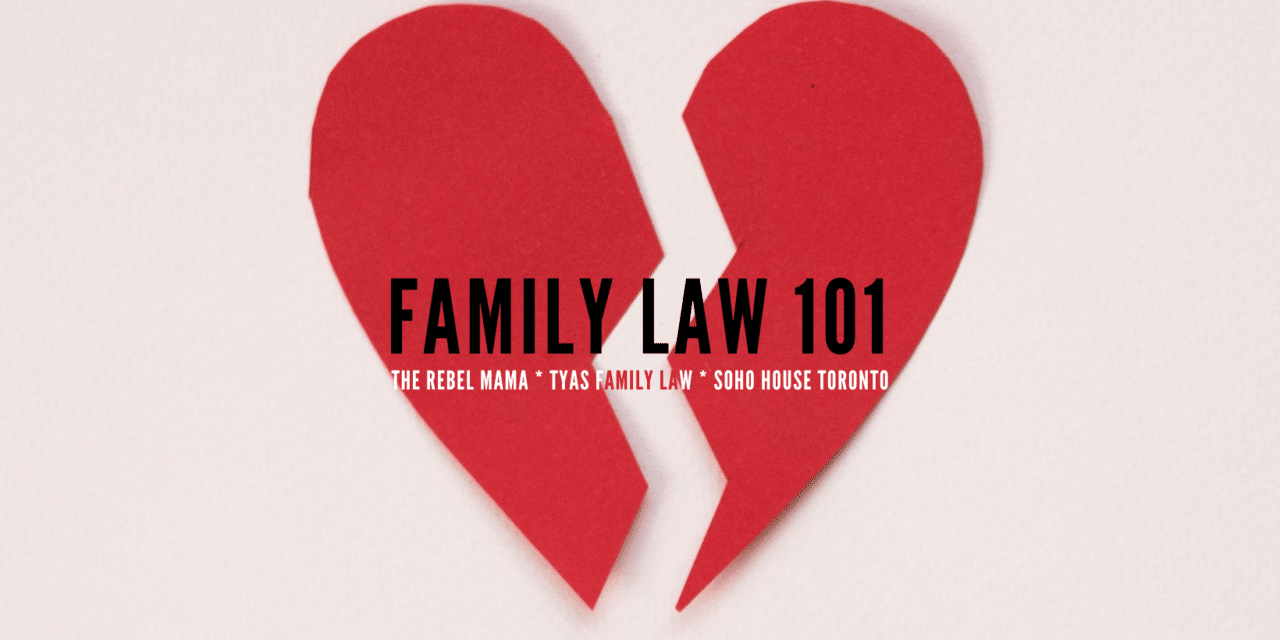Last week we hosted an incredibly informative event at Toronto’s Soho House, designed to educate people about all things Family Law.
It was inspired by one of our favourite badass mamas, Dr Andrea Gelinas, who also happens to be our favourite dentist (and yes, she’s accepting new patients)! Andrea is passionate about empowering women with both financial and legal literacy so she lent her time and voice to the event, sharing some of her first hand experience with separation / divorce and encouraging the audience to trust their intuition, do their own due diligence, and line up a solid support system.
To answer our community’s burning questions about prenups, divorce and everything in between, we brought in the big guns (a.k.a Julie Tyas and Katherine Linton) from Tyas Family Law. Julie is the founder of Tyas Family Law. She has almost 17 years of experience as a family law lawyer. Katherine has been a lawyer for 6 years, and has worked under Julie’s mentorship for over 4 years. Together, they represent half of the Tyas family law team.
Since we all believe that everyone deserves to know their rights as they pertain to family law, we made sure to record the session (with permission) so we could share them with the class.
Knowledge is power, so let’s get empowered together.

Family Law 101
What are some key things that you suggest people put into a prenuptial agreement?
Marriage contracts cover 2 things: (1) property division and (2) spousal support (in the USA, they call this alimony; in Canada, we call it spousal support). Nothing pertaining to child support is enforceable in a marriage contract.
How do the rights of common law partners differ to those of married couples in Ontario?
The primary difference is in the division of property. For example, if you’re in a common law relationship and own a condo under your name, it is presumed that the property is yours and will not be divided between parties if you are common law unless otherwise outlined in a Cohabitation Agreement (which we advise all common law partners to establish), or unless one of the spouses has a very strong trust claim.
What are some things one should consider when deciding to leave a marriage? What are the best steps to take?
First, you should trust your intuition. Then you should get organized.
That looks like:
– considering your family structure (do you own businesses together? Do you have children? Is abuse a factor?)
– meeting with lawyers (even if you’re not ready to take the plunge, they can help you organize your thoughts, outline the items you should get in order if you decide to proceed, make a plan to tell your partner etc)
– consider therapy (individual or couples) to narrow in on your wants, needs and intentions.
What does the law say about division of property for married people who never signed a prenup?
Anything you each have or accumulate together, once you get married (calculated from date of marriage to date of separation) will be equalized.
Example: You enter into the marriage with $1,000. Your partner enters the marriage with $500. On the date of separation, you have $2,000 and your partner has $1,000. Your increase in net worth between the date of marriage is $1,000 (which is called your “net family property” in legal terms) and your partner’s net family property is $500. As long as you and your partner were able to prove what you each had on the date of marriage (which can be difficult at times, as bank records only go back 7 years), you would owe your partner $250 so that the $500 difference between your respective net family properties is equalized. This overly simplistic calculation does not apply to matrimonial homes which are equalized regardless of who holds title on the date of marriage or the date of separation.
Can you tell us about the 65 rule ?
The Rule of 65 applies to the issue of spousal support, typically in long term marriages. It dictates that in a marriage longer than 5 years, if the age of lower income spouse + the length of marriage = 65+, then spousal support is deemed to be “indefinite”.
What is the difference between separation and divorce? Can you stay separated indefinitely?
This is a common question. Being “Legally separated” means that one person has made it clear to the other person that the relationship is over and there are no further steps being taken to reconcile (no vacations, no intimacy, no therapy etc). During a separation process, financial disclosure is exchanged and assets get divided. Then, after a final resolution has been established, you can apply for a divorce, provided you have been separated for a year (which is usually enough time to finalize the terms of your separation in the form of a Separation Agreement). A divorce is just a legal document signed by the court which allows you to legally marry someone else. Unless the ability to re-marry is a priority for you, then you can technically remain separated indefinitely.
Keep in mind, though, that there are Estate Law consequences for separation and divorce in addition to Family Law consequences. For example, if your will is not updated and you die during the separation / divorce period, your partner/spouse can still make claims for equalization and support. It is recommended to have a wills and estates lawyer review your will and discuss a future estate plan with you upon a separation.
What does separation / divorce look like financially? How can people better prepare themselves?
This process can be costly. It will be more so if one party is not cooperative (or if they have a terrible lawyer) because that will require more time invested on the part of your lawyer. Mediation can help lessen the cost. Keep in mind, though, that mediators can’t draft Separation Agreements (unless they are also a lawyer) but it can be helpful in some situations. For example, parenting mediators are cheaper than lawyers, and they deal with parents fighting about kids – sometimes it’s actually cheaper to have a mediator and a lawyer working in tandem.
Understand the concept of “sharing your wealth” – this means that whoever was more successful during the marriage will have to pay the one who wasn’t as successful. Prepare for this by taking photos of documents, establishing how much you had upon entering into the marriage. Knowing what you had prior to marriage is important, particularly if you came into the marriage with any assets.
Can you have a happy divorce? What are some ways to make that happen?
Julie thinks you can! Divorce itself doesn’t make anyone happy – it’s emotional, it’s traumatic, there is remorse, you are “grieving,” but there are things that will make it easier – like remaining focused on being amicable and both parties retaining lawyers. Happiness tends to arrive when the dust settles.
Coparenting – what structures have you found to be the most successful in an amicable split? Any tips for people navigating this side of divorce in a non-amicable situation?
The courts prioritize the best interests of the children and often employ the maximum contact principle. We’re seeing a shift in the old school thinking that prioritizes time with the mother. There are fewer recognizable “reasons” that a court will say that it is in a child’s best interests to spend a great deal more time with one parent over another. In terms of scheduling, for younger kids, the 2/2/3 schedule, based on a two week rotating schedule, is popular in equal parenting time situations. As they get older, that may change to a one-week-on, one-week-off schedule, and take into account the children’s wishes. A social worker will often get involved if there are any claims of abuse or addiction.
Finding the right lawyer is important. What kinds of questions do you suggest people ask their potential representation to ensure it’s the right fit?
Ensure transparency about fees, and consistent billing. Make sure the lawyer asks what your goals are and make sure you and your lawyer have mutual understanding of goals. Keep in mind that lawyers provide a service, just like a plumber or an electrician so call around before you commit.
Tyas Family Law works throughout the GTA and offers 20-30 min free initial calls to answer some pressing questions, help with short term plans etc. This allows clients to get a feel for them and allows them to somewhat “interview” the client – some are not a good fit for the firm and it’s good to identify that early.
Hot Tip: talking to many law firms can ensure a conflict for your partner (in other words: they can’t sign on with law firms who you have already spoken to). This tactic can be good (like if you meet with some notoriously dirty / aggressive firms) but don’t go talking to every reputable firm out there because your proceedings will go way more smoothly (and will cost less in the long run) if you and your partner both have good lawyers. In other words, don’t conflict out the good ones!
Check out collaborativedivorcetoronto.com for a comprehensive list of reputable Toronto based lawyers who work well on cases together.
Hope this has been useful and helpful for you all 🙂
xx RM

RESOURCES
BOOKS:
This American Ex Wife by Lyz Lenz (preorder)
A Renaissance Of Our Own by Rachele Cargle (preorder)
Too Good To Leave, Too Bad To Stay by Mira Kirshenbaulm
Conscious Uncoupling by Katherine Woodward
Mating In Captivity by Esther Perel
The Way Forward by Yung Pueblo
https://www.oprahdaily.com/entertainment/books/g43808462/best-books-on-divorce-and-separation/
ARTICLES:
https://slate.com/culture/2024/02/lyz-lenz-book-divorce-this-american-ex-wife.html
https://www.psychologytoday.com/ca/blog/divorce-busting/202209/the-walkaway-wife-syndrome-revisited
https://goop.com/ca-en/wellness/relationships/conscious-uncoupling-2/
https://financialpost.com/real-estate/mortgages/spousal-buyout-keep-family-home-splitting-up
https://www.nytimes.com/2010/08/01/fashion/01Undivorced.html
https://www.psycom.net/divorce
PODCASTS:
Esther Perel
Brene Brown
Marriage and Martinis
The Divorce Survival Guide
*
Have more specific questions? Do not hesitate to reach out to the Tyas Family Law team for a FREE 20 minute consultation at: https://tyasfamilylaw.ca/










From Our Comments